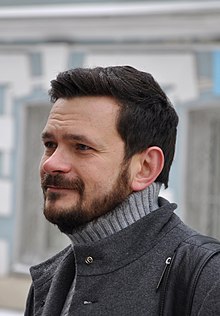Opposition Activist Ilya Yashin's Defiant Political Struggle Continues From Abroad
Ilya Yashin, a Russian opposition activist released during a historic prisoner swap, vows to continue his political fight against President Putin from abroad despite his involuntary expulsion. Alongside other freed activists, Yashin criticizes the Kremlin's tactics and pledges to work for a free and democratic Russia.

Ilya Yashin, a Russian opposition activist freed from jail during Thursday's prisoner swap, pledged to continue his political fight against President Vladimir Putin from abroad, although he expressed anger at being deported against his will. The swap, the largest since the Cold War, exchanged eight Russians, including a convicted murderer, for 16 prisoners from Russian and Belarusian jails, many of them dissidents. Western leaders hailed the exchange as a win, fearing for the dissidents' lives after the death of politician Alexei Navalny in jail last year.
However, Yashin, imprisoned in 2022 for criticizing Putin's full-scale invasion of Ukraine, did not consent to deportation and suggested others in more urgent need should have been chosen. 'From my first day behind bars I said I was not willing to be part of any exchanges,' Yashin stated emotionally during a news conference in Bonn. He directed his ire at the Kremlin for expelling a political rival against his will, not at Western governments who faced a difficult moral dilemma.
He appeared with activists Vladimir Kara-Murza and Andrei Pivovarov at their first public appearance since arriving in Germany. Fired with resolve, all expressed scorn for Putin, whom Kara-Murza called an illegitimate usurper. Yashin pledged to continue his work 'for Russia' from abroad, though he was uncertain of how. Pivovarov agreed, vowing to make the country free and democratic and to release all political prisoners.
Former Russian president Dmitry Medvedev commented that traitors should rot in prison, but it was more strategic for Moscow to retrieve its own. Kara-Murza recounted refusing to appeal for clemency, denouncing Putin as a dictator, usurper, and murderer. He called Putin responsible for the deaths of Navalny and others, as well as thousands of Ukrainians.
Kara-Murza, serving a 25-year sentence, was certain he would die in jail but acknowledged the tough decision faced by German Chancellor Olaf Scholz to release a convicted murderer for their safety. 'Scholz is being criticized for freeing Putin's killer, but easy decisions only happen in dictatorships,' he said, lamenting that swifter actions might have saved Navalny.
Describing his ordeal and psychological torture, Kara-Murza revealed he was barred from speaking to his family, banned from church, and kept in solitary confinement, all the while being told he had little time left to live due to poisoning.
(With inputs from agencies.)










